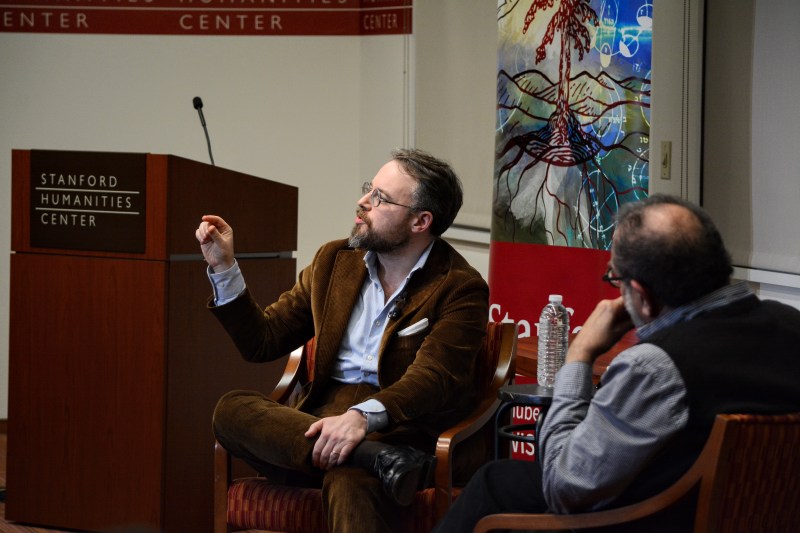On Tuesday, writer Joshua Cohen recounted how a famous literary critic’s offhand remark inspired his Pulitzer Prize-winning novel, “The Netanyahus.”
During the Stanford Humanities Center event, Cohen discussed Jewish American literary influences, writing amid the pandemic and the little-known historical episode fictionalized in the novel. Steven J. Zipperstein, professor of Jewish culture and history and faculty director of the Taube Center, moderated the conversation.
Cohen, who struck up a friendship with Harold Bloom toward the end of the critic’s life, stumbled on the premise for “The Netanyahus” during a trip to Yale University. He was sitting in Bloom’s living room when Benjamin Netanyahu’s face appeared on television — Bloom mentioned that he had met the prime minister as a 10 year old, and Bloom’s wife, Jeanne Gould, recounted a peculiar visit by the Netanyahus to Cornell University.
“My name is Rubin Blum,” Cohen read aloud from the beginning of his novel. “I am a Jewish historian, but I am not a historian of the Jews.” The year is 1959, and Blum, a reimagined version of Bloom, is a scholar of taxation at the fictional Corbin College in New York.
As the only Jewish professor at Corbin, Blum weathers antisemitic blunders by his colleagues. When a bombastic Israeli scholar of the Spanish Inquisition arrives on campus looking for a job, Blum and his wife are tasked with hosting his entire family, who practically crash land on their doorstep.
The man is no ordinary applicant. He was Benzion Netanyahu, the ardently Zionist father of a 10-year-old Benjamin Netanyahu — who would one day become Israeli prime minister.
“The novel is about the Netanyahu that no one cares about,” Cohen said.
What follows is a seriocomic portrait of mid-century academic life and evolving Jewish American identity.
Bloom and Gould’s scraps of memory were the genesis of “The Netanyahus,” sparking Cohen’s prodigious imagination during the pandemic lockdowns of 2020, years after his trip to Yale.
Writing in the face of disease and death accelerated Cohen’s process, infusing the work with a sense of impending doom.
“I had a sense that my life was over,” he said. “I was doing two dumb things — writing an academic novel and a historical novel. I thought I was ruining a life that was going to end in a few months.”
“It’s nice to be out of the house,” Cohen joked about his Stanford visit.
The novel seemed doomed at first. Twenty-four publishers rejected the manuscript, Cohen said, prompting murmurs of surprise among the audience.
“No one can even pronounce the word ‘Netanyahu’ in this country,” Cohen quipped.
Soon after publication, however, “The Netanyahus” won praise for its biting wit, audacious approach to history and vigorous prose style.
A trained composer, Cohen told Zipperstein that he hears sentences the way a musician does melody. “I try to think of sentences like counterpoint,” he said. He prefers to write by hand in order to “feel the periodicity” of language, listening for harmonies between the multiple “lines” that compose a sentence.
Cohen speaks with the same linguistic virtuosity that characterizes his writing. Throughout the event, he traded friendly zingers with Zipperstein and the audience, indifferent to causing offense.
When Zipperstein brought up Jewish American writer Philip Roth’s influence on Cohen’s writing, Cohen sighed over the comparison — one made throughout his writing life.
Cohen acknowledged that “The Netanyahus” dealt with the style of 20th-century Jewish literature, including Roth’s “Goodbye Columbus.”
Yet, the novel introduced subjects long “buried,” he said, including the post-war Jewish diaspora. In writing “The Netanyahus,” he wanted to capture the 1950s “with those ghosts really in the foreground,” he said.
During a Q&A, the conversation turned to antisemitism in the wake of Hamas’s Oct. 7 attack on Israel. “I was shocked by the barbarity of Oct. 7 as I was shocked by the violence of Israel’s response,” Cohen said. “But I wasn’t surprised by the outpouring of antisemitism.”
One audience member asked whether Cohen felt identity “circumscribed his imagination” and compelled him to write from certain perspectives and not others. In response, Cohen said he was unafraid of social sanctions. “Writing is not a career to me,” he said. “I don’t know how the reactions of other people will demonstrably make my life worse.”
“Why tell stories?” Zipperstein asked Cohen at the conclusion of the event.
“I write portraits of people who desperately need to tell stories,” Cohen said. “The impulse of someone to tell is almost a sufficient purpose for existence. It’s the most graceful way to express loneliness.”
